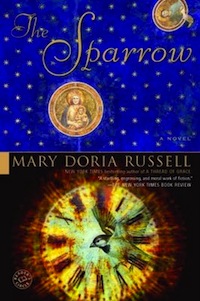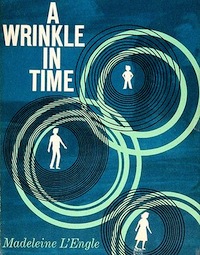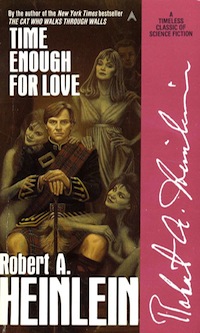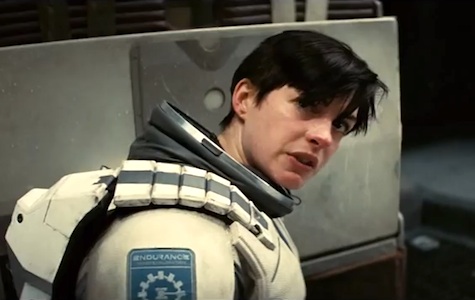While some of the characters in Christopher Nolan’s Interstellar grapple with the concept of quantifying and manipulating gravity, others posit that even when understanding of the physical forces of the universe fail you, love remains greater than everything else. Anne Hathaway’s character Dr. Amelia Brand says as much, in the movie’s most polarizing speech:
Love isn’t something we invented. It’s observable, powerful, it has to mean something… Love is the one thing we’re capable of perceiving that transcends dimensions of time and space.
Various outlets are deriding Brand’s second-act exhortation as “hippy,” (sic) “goofy,” and “preposterous.” Some blame Hathaway’s delivery, while others think that making Interstellar about love just as much as it’s about time, space, and gravity was a huge misstep on the Nolans’ part.
But why do we have such an adverse reaction on the concept of love as a force in science fiction?
Spoilers for Interstellar (as well as the other books/movies discussed) are ahead.
We have no problem believing in the all-encompassing power of love in fantasy. Harry Potter was spared from an Avada Kedavra curse—and several subsequent wand matches with Voldemort—because of the love his mother Lily shielded him with upon death. This explanation doesn’t require a detailed equation or precise potion; we simply accept that love and magic are linked.
But if the Thor movies have taught us nothing else, it’s that magic and science are not mutually exclusive. Through transitive relation, why can’t love also exist on the same plane as science?

In Interstellar, Amelia Brand regards love in much the same way that we regard gravity: It’s this complex force that influences everything; we’ve measured and observed it to the point where we have a pretty clear understanding of its effects; people devote their whole lives to observing it. And yet, we have no idea why it exists.
Time for some more transitive-theory fun: One Reddit thread suggests that gravity is the fifth dimension in which they, a.k.a. we, flourish; love (which we already describe with such words as “attraction”) is gravity; if 5-D is a plane of existence where you can know everything, then love/gravity is omniscient.
Brand argues in the film that love is a propulsive force, sending us in the directions we need to go. Sometimes we feel that we are tapping into that force of love; other times, it picks us up and forcibly pushes us toward the right decision or action. This isn’t unique to Interstellar; other sci-fi works ascribe much the same power to love, including the ability to manifest as a weapon and the power to induce self-awareness and evolution.
Love as propulsive force
First, let’s get this out of the way: Christopher Nolan’s other big, mind-bendy movie Inception is also about love propelling people to achieve amazing feats. Dom Cobb’s love for his children is what drags him out of Limbo and through all of the interlocking dream layers, to finish the job and return home.
Cobb is not unlike Cooper (Matthew McConaughey), who had to jump into the black hole in order to save humanity, especially his children. No matter that our 5-D civilization planted the wormhole in the first place; without Coop’s desire to save Murph and the rest of humanity, the sequence of events would not have occurred and Earth wouldn’t have gotten saved.
opens in a new window But love doesn’t push us across time and space only in the Nolans’ universe. The explorers in Mary Doria Russell’s novel The Sparrow believe themselves called by God (or some other higher power) to embark on a mission to the planet of Rakhat. At first it’s coincidence that brings these people together, with the right set of skills and knowledge, to hear an alien transmission for the first time and be called to visit this distant planet.
But love doesn’t push us across time and space only in the Nolans’ universe. The explorers in Mary Doria Russell’s novel The Sparrow believe themselves called by God (or some other higher power) to embark on a mission to the planet of Rakhat. At first it’s coincidence that brings these people together, with the right set of skills and knowledge, to hear an alien transmission for the first time and be called to visit this distant planet.
But Father Emilio Sandoz, the Jesuit priest and sole survivor of the Rakhat mission, believes that the force drawing him and the rest of the explorers to a whole new star system is God’s will. Greater than God’s will, it’s His love. Sandoz relates how, upon their precarious landing in the alien planet’s atmosphere, they all clung to love for comfort:
I am where I want to be, they each thought. I am grateful to be here. In their own ways, they all gave themselves up to God’s will and trusted that whatever happened now was meant to be. At least for the moment, they all fell in love with God.
No one is more in love with God than Sandoz, who believes that he has achieved his life’s work and that his faith is being rewarded. Hoo boy, is he wrong.
Speaking of sci-fi works that deal with humans’ thorny relationship to religion… In Joss Whedon’s Serenity, love is more vital than a spinning engine or complete mastery of the pilot’s console, as Mal explains to River on her first flight as Serenity’s new co-pilot:
You know what the first rule of flying is? Love. You can learn all the math in the ’verse, but take a boat in the air that you don’t love… she’ll shake you off, just as sure as the turnin’ of the worlds. Love keeps her in the air when she oughta fall down, tell you she’s hurting before she keels… makes her a home.
Love as a weapon
opens in a new window When Meg Murry must do battle with the massive creature IT to free her little brother from its grasp in Madeleine L’Engle’s A Wrinkle in Time, she receives three gifts from her guides Mrs. Who, Mrs. Which, and Mrs. Whatsit. One quotes a Bible passage to her; another gives her love; and the third tells her that she has something that IT doesn’t have.
When Meg Murry must do battle with the massive creature IT to free her little brother from its grasp in Madeleine L’Engle’s A Wrinkle in Time, she receives three gifts from her guides Mrs. Who, Mrs. Which, and Mrs. Whatsit. One quotes a Bible passage to her; another gives her love; and the third tells her that she has something that IT doesn’t have.
If you guessed love, then you’re catching on! By the time Meg gets to her brother Charles Wallace, he’s almost been absorbed into IT—just another identity-less minion. But by focusing her love on him, she brings out his uniqueness, something IT could never possess. Boom.
While The Sparrow was about one man’s love in God being shaken, its sequel Children of God sees a woman, forever resistant to love, harness it as a weapon for revolution. Sofia Mendes, thought slain by the end of the first book, has survived on Rakhat, pregnant with her dead husband’s child and knowing that humankind has abandoned her (as she taps into the communications between Earth and the ship, realizing that they have left for the return trip without looking for survivors). Love is a debt, she tells herself. When the bill comes, you pay in grief. Yet she has no other choice but to love the aliens among whom she makes her home and who she eventually leads to independence from their masters.
Love induces a similar cultural upheaval in Brian K. Vaughan and Fiona Staples’ sci-fi comic book series Saga. Enemy soldiers Marko and Alana fall in love, have a baby, and try to escape the clutches of various species who want to erase all treasonous evidence of their existence. Interestingly, Alana and Marko’s attraction doesn’t start with some pure, omnipotent force; they bond over trashy romance novels with secret political messages. Still, one book is enough to spark a love that turns the galaxy upside-down.

But also, Alana has a gun called a Heartbreaker, so that’s wonderfully literal.
Love as evolution
 The immortal and flesh-and-blood characters in Robert A. Heinlein’s Time Enough for Love spend a lot of time debating the L-word. Some of them have all eternity to muse on its nature, while others yearn to know the answers before they pass out of this plane. But in debating computers’ self-awareness, immortal being Lazarus Long best sums it up:
The immortal and flesh-and-blood characters in Robert A. Heinlein’s Time Enough for Love spend a lot of time debating the L-word. Some of them have all eternity to muse on its nature, while others yearn to know the answers before they pass out of this plane. But in debating computers’ self-awareness, immortal being Lazarus Long best sums it up:
Babies or big computers—they become aware through being given lots of personal attention. “Love” as it’s usually called.
In a way that neither the passage of time, nor gravity, nor data can achieve, love is the key to evolution. Love lifts us up where we belong to another state.
…Perhaps to the fifth dimension? Interstellar never explains how we become they. Perhaps it’s love that ushers us into a new state of being. Perhaps our future selves are able to finally grasp the breadth of love’s influence across all of the dimensions.
Look, it was a cheesy speech designed to seed in a later plot point. I won’t deny that. But the emotional factors shouldn’t undermine the idea that love is just as concrete and powerful as the other forces making up our universe. It’s no more unstable than certain radioactive elements, it pushes and pulls us better than gravity ever could, and it endures through time.
Natalie Zutter writes plays about superheroes and sex robots, articles about celebrity conspiracy theories, and Tumblr rants about fandom. You can find her commenting on pop culture and giggling over Internet memes on Twitter.










